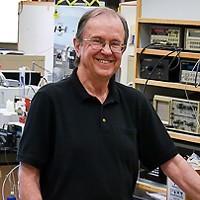Peter Tremaine

Fellow, Chemical Institute of Canada
Honorary Fellow, International Association of Water and Steam
Professor
Research Chair, UNENE
College of Engineering and Physical Sciences
Department of Chemistry
Guelph, Ontario
tremaine@uoguelph.ca
Office:
(519) 824-4120 ext. 53811
(519) 824-4120 ext. 56076
Expert In
Bio/Research
The objective of Dr. Tremaine's research in the hydrothermal chemistry group is to develop the knowledge base and theoretical understanding needed to describe the behaviour of aqueous systems at extremes of temperature and pressure, and to apply these results to fundamental problems encountered i...
Click to Expand >>
Click to Expand >>
Bio/Research
The objective of Dr. Tremaine's research in the hydrothermal chemistry group is to develop the knowledge base and theoretical understanding needed to describe the behaviour of aqueous systems at extremes of temperature and pressure, and to apply these results to fundamental problems encountered in electrical power stations, nuclear reactors, geothermal ore bodies, deep-ocean hydrothermal vents, and the thermal recovery of heavy oil.
Sensitive flow calorimeters, densitometers and AC conductance cells, constructed of inert materials to withstand the corrosive conditions, are used to determine the thermodynamic properties of simple electrolytes and organic molecules in liquid water at temperatures up to 400°C and pressures as high as 300 atmospheres, to examine the effects of ionic charge and organic functional groups under conditions approaching the critical point of water. The form of the chemical species, and their equilibrium constants at high temperature and pressure, are being determined by conductance methods, and by UV-visible and Raman spectroscopy in flow systems with sapphire windows or in diamond anvil cells. Spectroscopic, heat capacity and volumetric studies on metal complexes with ammonia, halides and chelating agents such as EDTA, provide data and models to describe the temperature dependence of transition metal complexation and chelation equilibria.
The novelty of Tremaine's work lies in the very extreme conditions being studied, the potential for identifying unusual effects, and the need to develop specialized instrumental techniques to obtain quantitative data for multi-component aqueous systems under these very aggressive conditions.
Click to Shrink <<
Sensitive flow calorimeters, densitometers and AC conductance cells, constructed of inert materials to withstand the corrosive conditions, are used to determine the thermodynamic properties of simple electrolytes and organic molecules in liquid water at temperatures up to 400°C and pressures as high as 300 atmospheres, to examine the effects of ionic charge and organic functional groups under conditions approaching the critical point of water. The form of the chemical species, and their equilibrium constants at high temperature and pressure, are being determined by conductance methods, and by UV-visible and Raman spectroscopy in flow systems with sapphire windows or in diamond anvil cells. Spectroscopic, heat capacity and volumetric studies on metal complexes with ammonia, halides and chelating agents such as EDTA, provide data and models to describe the temperature dependence of transition metal complexation and chelation equilibria.
The novelty of Tremaine's work lies in the very extreme conditions being studied, the potential for identifying unusual effects, and the need to develop specialized instrumental techniques to obtain quantitative data for multi-component aqueous systems under these very aggressive conditions.
Click to Shrink <<